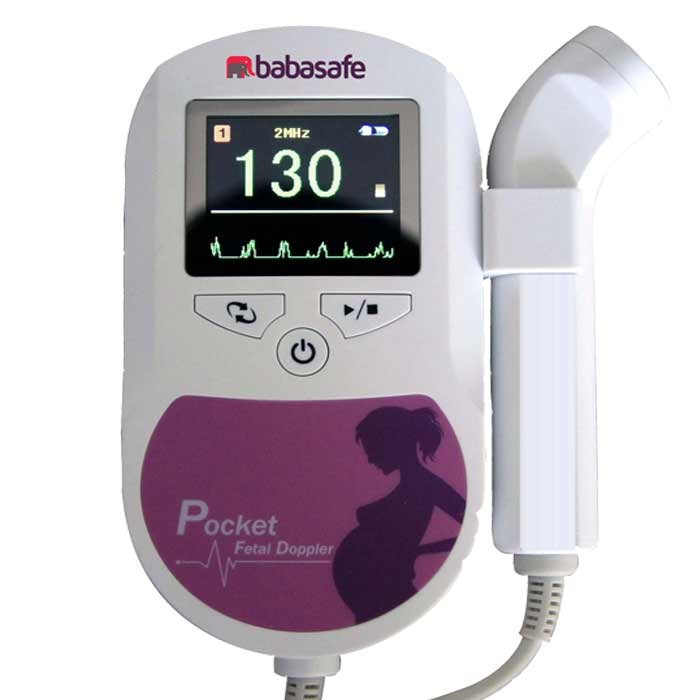
This is more worrying when it comes to at-home fetal dopplers, because some parents might want to reach for their fetal dopplers every day. As an FDA biomedical engineer explains, “Ultrasound can heat tissues slightly, and in some cases, it can also produce very small bubbles (cavitation) in some tissues.” There isn’t any research that shows that ultrasounds are harmful, but it’s best to err on the side of caution when it comes to your baby’s health. The only time you should use a doppler, the FDA says, is when a doctor is using it, in which case it is medically necessary. In 2014, the Food and Drug Administration (FDA) advised against using fetal dopplers. While at-home fetal dopplers are appealing to many parents-to-be, there are some safety concerns. Remember, it’s common to only hear the heartbeat from the second trimester onward, so it’s important to know yourself and know if not hearing it may cause you unnecessary worry. You may want to play around with your doppler and see if you can hear anything. However, anecdotally, many people say that they used their doppler before it was meant to pick anything up, and they managed to hear their little one’s heartbeat.

(And just a reminder: By this time, you should be feeling your baby kick and may even hear that little heart beating away with nothing but a good ol’ stethoscope.)īut we know what you’re really wondering - can any over-the-counter fetal dopplers work earlier than nine weeks? The short answer: We couldn’t find an up-and-up brand that claims this. Some companies even state that their dopplers should only be used in the third trimester - that is, from week 28 onward. While some brands claim that their fetal dopplers can detect heartbeats from 9 weeks into the pregnancy, others claim they only work from around week 16. How early will an at-home fetal doppler work? Not to mention, they can also be a source of support - which is great if you’re feeling nervous or if you have any questions. Your healthcare provider is also best equipped to diagnose and treat any potential health issues. They know what all the sounds mean - there’s a lot going on in there! - and they know what’s concerning (and what’s not). More importantly, your doctor or midwife is trained to operate a doppler. You can’t always be sure whether you’re getting an accurate and safe product. There are no regulations for selling dopplers online, so this is a bit like the Wild, Wild West, folks. Think about it: Your doctor will always have medical-grade, accurate equipment, approved by any required safety agencies.īut practically any company can create a device (or perhaps worse - an app for a device), call it a doppler, and sell it online. One of the reasons for this is because home fetal dopplers can be of poor quality. In other words, they’re meant to be used in between visits to the doctor, not instead of visits to the doctor. the one at the doctor’s officeĪ home fetal doppler can’t be used in place of a doctor’s appointment. It’s important to know about the safety hazards of at-home fetal dopplers before you use one. So what’s the harm? Well, possibly very little.īut not so fast. It may also ease anxiety and help you feel more connected to your baby. Some dopplers (yes, even those you encounter at your OB’s office!) only detect it after about 12 weeks.įor many, hearing the heartbeat at the doctor’s office is a magical, joyful, and reassuring experience - and the time between appointments is just so darn long to wait to hear that sweet sound again! The idea of listening to the heartbeat in between doctor’s appointments is appealing. If your doctor can’t hear a heartbeat in the first trimester, it’s not necessarily a cause for concern. When you go to your doctor for a check-up, they’ll use one of these devices - hopefully, not without warming the ultrasound gel first! - to detect your baby’s heartbeat from around 8 to 10 weeks. Many people are anxious for peace of mind or eager to bond with baby - which is why at-home fetal dopplers are so popular.Ī fetal doppler - whether at the doctor’s office or purchased for home use - is a hand-held ultrasound device that uses soundwaves to listen to a fetal heartbeat.

Or maybe you’re not so nervous as you are wanting to bond with your baby a little more - looking for a way to connect.įirst, rest assured that you’re not alone in your concerns.

Wouldn’t it be great if I could check on my little one right now? you find yourself thinking. You want some reassurance that everything is A-OK. You’re pregnant and you know it can be an exciting, beautiful experience.


 0 kommentar(er)
0 kommentar(er)
